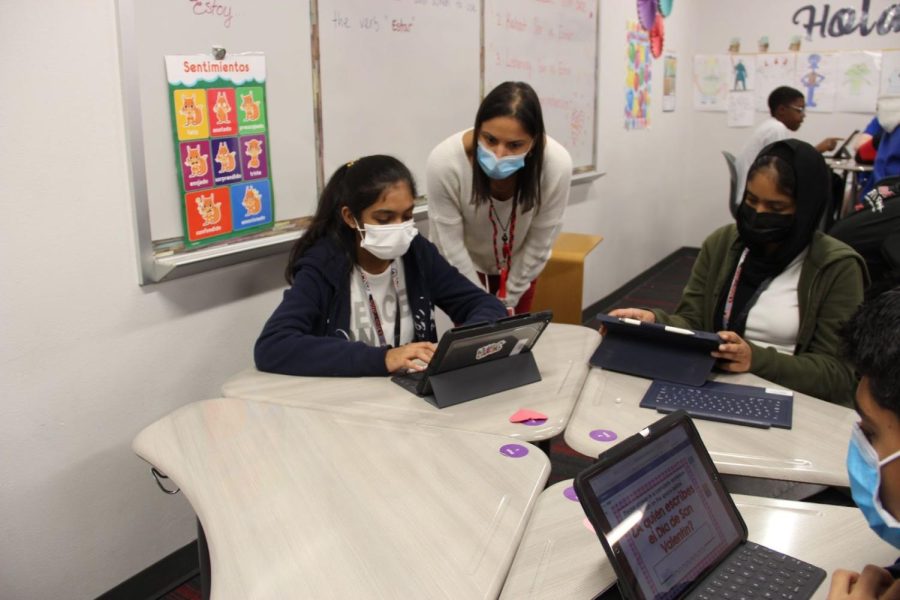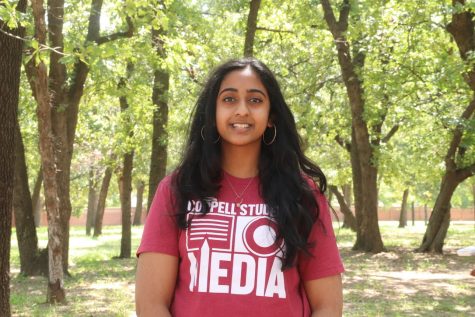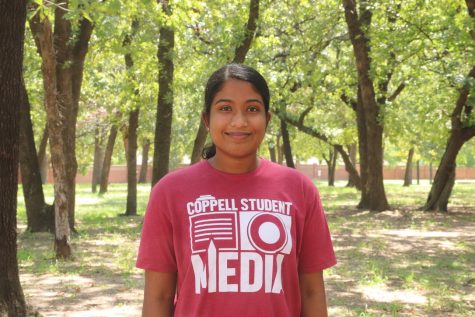CHS9 December, January teacher spotlight teaching through experience
CHS9 Spanish teacher Alicia Prado assists freshmen Safa Ahmed and Sabah Udin with an activity about conjugating verbs in the present tense during seventh period on Feb. 14. Prado was named the December and January Teacher Spotlight for her dedication and innovative learning style.
February 22, 2022
Alicia Prado was introduced to the world of teaching through substituting. Her brief stint substituting at Denton Creek Elementary School led to a love for school environments, and consequently, a spot at CHS9 teaching Spanish I. Prado was honored by her fellow department members as the CHS9 December, January Teacher Spotlight.
What made you want to work in a school setting?
I started as a substitute teacher because it was convenient for me, a mother of three kids, to be a substitute because it was the same schedule as my kids. And once I started doing that, I really enjoyed being with students in the learning environment and the school.
How did you start working as a teacher?
I [was offered a job] in the office at Denton Creek Elementary. It was more administrative, of course, but I still got to see the background of teaching. I decided I wanted to be a teacher because I missed being with the students like when I was a substitute. And at Denton Creek, there’s the dual language program, and my kids are bilingual. So I decided I wanted to teach Spanish because I believe it’s a great opportunity for people to speak a second language.
Why did you choose to teach Spanish?
I love my culture, and I love to share it not only through teaching the language, but also sharing with people the difference in the cultures because that makes us understand other people better when you can understand their culture. I am from Venezuela, and I left my country when I was 28. I lived in Argentina for four years, then I lived in Chile for six years. That experience living in other countries helped me also understand how important it is to be conscious about the history and the culture of the people.
Did you find it difficult to start teaching ninth graders?
It was a challenge. I was afraid at the beginning. But I don’t find it difficult. It’s just different. Ninth graders have different skills. With little kids, it is fun because you get to do more songs and funny things that they like, the ninth graders are more independent. I was afraid at the beginning but I love it right now. It’s great.
How does it feel to receive the CHS9 teacher spotlight?
It felt great to be noticed and to realize that what you are doing is impacting other people. In this case, my coworkers. I feel really glad that what I do is helping them in a way, that what I am doing is bringing in good results and good ideas for them.
What is one lesson you want your students to take away from your class?
I would like them to understand that being different is good, not bad. It is actually an advantage. I would like them to get out of here understanding that difference is what makes the world richer, and that they can be respectful and appreciate everybody. I would love them to get out of here speaking Spanish, at least the basics because this is Spanish I.
When you are out of your comfort zone, your country, your people, your culture, your food, your friends, you have to build upon skills that allow you to feel good, feel accepted and welcome. — Alicia Prado
How have your roots in Venezuela and your time in Argentina and Chile affected the way you’ve taught your students?
Being able to live in other countries gives you another perspective of the world, even though I haven’t been to many other places. You have to be flexible and adapt and I think that’s one strength that I got from those experiences, that I can be flexible, that I can adapt, that I can make changes and take changes part of the everyday.
Do you have a favorite Spanish phrase or word that you use with your students a lot?
If there is a stone, in your path in your way, be the one who can move it out of the way.
Follow Anette (@AnetteVarghese) and @CHSCampusNews on Twitter.











